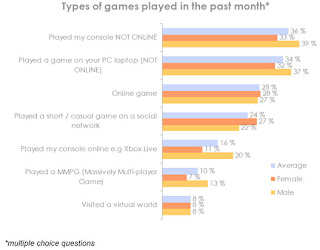>
Report Finds More Women, Adults Play Games
June 7, 2011 – Washington, DC – 72 percent of American households play video games and 82 percent of gamers are adults according to new research released today by the Entertainment Software Association (ESA). In a report released at E3, the world’s leading video game event, the data presented a consumer base that is increasingly diverse and receiving interactive game content on myriad platforms.
The report, 2011 Essential Facts About the Computer and Video Game Industry, also found 42 percent of gamers are women and that women age 18 or older represent more than one third of the game-playing population. In addition, purchases of digital full games, digital add-on content, mobile apps, subscriptions and social network gaming accounted for 24 percent of game sales in 2010, generating $5.9 billion in revenue.
“Our industry’s innovative titles are reaching new consumers in broader, deeper and more-engaging ways,” said Michael D. Gallagher, president and CEO of the ESA. “Technological advancements and terrific entertainment experiences in our industry make it possible for people of all ages to enjoy games at home or on the go, and the creativity of our developers and publishers leads to an ever-expanding variety of video games to choose from in both digital and physical formats.”
The survey also found that parents remain highly involved in their children’s game play and see several benefits of entertainment software. Forty-five percent of parents report playing computer and video games with their children at least weekly and nine out of ten parents pay attention to the content of the games their children play. In addition, 68 percent of parents believe that game play provides mental stimulation or education, 57 percent believe games encourage their family to spend time together, and 54 percent believe that game play helps their children connect with their friends.
Other findings of the survey include:
- The average game player is 37 years old, while the average game purchaser is 41 years old;
- Sixty-five percent of gamers play games with other gamers in person;
- More than half (55 percent) of gamers play games on their phones or handheld devices;
- Eighty-six percent of parents are aware of the Entertainment Software Rating Board rating system, and 98 percent of these parents are confident in the accuracy of the ratings;
- Parents are present when games are purchased or rented 91 percent of the time; and
- Consumers spent $25.1 billion on game content, hardware and accessories in 2010.
The research for the 2011 Essential Facts About the Computer and Video Game Industry was conducted by Ipsos MediaCT and is the most in-depth and targeted survey of its kind, gathering data from almost 1,200 nationally representative households that have been identified as owning either or both a video game console or a personal computer used to run entertainment software.
The Entertainment Software Association is the U.S. association dedicated to serving the business and public affairs needs of companies publishing interactive games for video game consoles, handheld devices, personal computers, and the Internet. The ESA offers services to interactive entertainment software publishers including a global anti-piracy program, hosting the E3 Expo, conducting business and consumer research, representing the video game industry in federal and state government relations, First Amendment and intellectual property protection efforts.
For more information, please visit www.theESA.com.
Posted in consumer, Research | No Comments »




